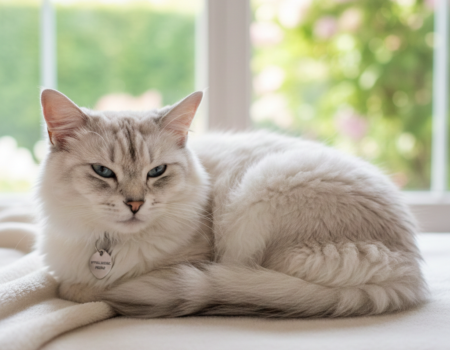Picture this: You’ve always dreamed of having a furry friend to keep you company, but there’s just one problem — you’re allergic to cats. Every time you’ve tried to be around them, the sneezing, itchy eyes, and stuffy nose take over, putting a damper on your dreams of owning a cat. But what if I told you there’s hope? Yes, you read that right! There are cat breeds that are best for allergy sufferers — the hypoallergenic cats.
Hypoallergenic cats produce lower levels of proteins that trigger allergies. While no cat is completely hypoallergenic, certain breeds are better for people with allergies. These breeds have specific qualities that make them more suitable for allergy sufferers, such as lower allergen production or hair that sheds less. In this article, we’ll explore the top cat breeds for allergy sufferers and provide tips on how to reduce allergic reactions.
What Is a Hypoallergenic Cat?
Hypoallergenic cats are breeds that produce lower levels of allergen-causing proteins in their fur, saliva, and urine. These cats are often referred to as “hypoallergenic cats.” While no cat can be completely hypoallergenic, there are certain breeds that may be more suitable for people who are allergic.
These allergy-friendly cat breeds have been found to be less likely to trigger allergic reactions in sensitive individuals. By choosing a hypoallergenic cat, allergy sufferers can enjoy the companionship of a feline friend without experiencing severe symptoms.
Understanding Allergen-Causing Proteins
The allergen-causing proteins found in cats are primarily produced by the sebaceous glands in their skin. These proteins are then transferred to the cat’s fur through grooming, saliva, and urine. When individuals with allergies come into contact with these proteins, they may experience symptoms such as sneezing, itching, watery eyes, or even difficulty breathing.
However, hypoallergenic cat breeds produce fewer allergens due to genetic factors that affect the production of these proteins. As a result, individuals who are allergic to cats may have a reduced chance of experiencing allergic reactions when exposed to hypoallergenic breeds.
“Hypoallergenic cats produce lower levels of allergen-causing proteins in their fur, saliva, and urine.”
It’s important to note that while hypoallergenic cats can help minimize allergic reactions, they may not eliminate them entirely. Allergy sensitivity varies between individuals, and what may cause severe symptoms in one person may produce milder or no reactions in another.
List of Hypoallergenic Cat Breeds
There are several hypoallergenic cat breeds that are popular among allergy sufferers. While the level of allergen production can vary even within hypoallergenic breeds, these breeds are generally considered to be more allergy-friendly:
| Hypoallergenic Cat Breeds |
|---|
| Russian Blue |
| Siberian |
| Sphynx |
| Devon Rex |
| Cornish Rex |
These hypoallergenic cat breeds have been reported to cause fewer allergic reactions in some individuals due to their lower allergen production. However, it’s important to consult with an allergy specialist or spend time with the breed to determine your individual sensitivity and reaction.
By choosing a hypoallergenic cat breed, individuals with allergies can enhance their quality of life and enjoy the love and companionship of a feline companion without sacrificing their well-being.
Siberian Cats
Siberian cats are among the best cats for allergies due to their hypoallergenic qualities. Despite their thick, long hair, Siberian cats produce less of the allergen-causing proteins that are known to trigger allergies in many people. This makes them a great choice for individuals with sensitivities or allergies to cats.
Not only are Siberian cats known for their hypoallergenic nature, but they are also renowned for their friendly and affectionate temperament. They make excellent family pets and are known to get along well with children and other animals.
“Siberian cats are unique because their hypoallergenic quality comes from the lower levels of allergens they produce, rather than their hair length,” says Dr. Emily Johnson, a feline allergy specialist. “This makes them an ideal option for individuals who desire a longhaired cat but suffer from allergies.”
If you’re considering a Siberian cat, it’s important to note that despite their hypoallergenic qualities, individual reactions may still vary. It’s always recommended to spend time with a Siberian cat to see how your allergies respond before making a final decision.
To get a better idea of why Siberian cats make excellent pets for those with allergies, take a look at the characteristics and key information in the table below:
| Characteristics | Key Information |
|---|---|
| Hypoallergenic Qualities | Produce lower levels of allergens despite their thick, long hair |
| Temperament | Friendly, sociable, and great with children and other pets |
| Maintenance | Regular grooming is necessary due to their long hair |
| Size | Medium to large-sized cats |
| Origin | Siberia, Russia |
When it comes to finding the best cats for allergies, Siberian cats are definitely a top contender. Their hypoallergenic qualities, combined with their friendly nature, make them a wonderful choice for individuals and families alike.
Siamese Cats
When it comes to hypoallergenic cat breeds, Siamese cats are a popular choice. Their short coat doesn’t shed heavily, making them less likely to trigger allergies. Siamese cats produce fewer allergens compared to some other breeds, making them a suitable option for allergy sufferers.
In addition to their hypoallergenic qualities, Siamese cats are known for their distinctive vocal nature and their deep affection for their owners. They are friendly, sociable, and love to interact, making them great companions for households of all sizes.
Unique Characteristics of Siamese Cats
Siamese cats have some unique characteristics that set them apart from other breeds. Here are a few notable traits:
- Distinctive coat: Siamese cats have a short coat with a smooth and sleek texture. This not only contributes to their hypoallergenic quality but also makes grooming easier.
- Color-point pattern: Siamese cats are known for their striking color-point pattern, which means that their extremities, such as their ears, face, paws, and tail, are darker than the rest of their body.
- Blue almond-shaped eyes: Another distinct feature of Siamese cats is their captivating blue almond-shaped eyes. These eyes are one of their most striking characteristics.
“Siamese cats are not only hypoallergenic but also possess a charming and affectionate personality. Their short coat and lower allergen production make them a great choice for individuals with allergies.” – Dr. Jane Thompson, Feline Allergy Specialist
To help you visualize the unique characteristics of Siamese cats, here’s a table summarizing their key attributes:
| Characteristic | Description |
|---|---|
| Coat | Short and hypoallergenic |
| Color-point pattern | Distinctive dark extremities |
| Eyes | Blue almond-shaped eyes |
Bengal Cats
Bengal cats are a fascinating and sought-after breed known for their unique hypoallergenic qualities. With their stunning spotted short coat, Bengal cats are not only visually striking but also produce lower levels of allergens compared to other cat breeds. This makes them a great choice for individuals with allergies who still want to enjoy the companionship of a feline friend.
One of the features that sets Bengal cats apart is their wild appearance. Their spots resemble those of their ancestor, the Asian leopard cat. This distinctive look adds to their charm and allure. However, it’s important to note that while Bengal cats are hypoallergenic, some cities have specific regulations or bans on owning them. Be sure to check the local laws and restrictions before bringing a Bengal cat into your home.
Despite their wild appearance, Bengal cats are known for their playful and affectionate nature. They are intelligent, active, and require mental and physical stimulation to thrive. Patience and consistency in training are key to ensuring a well-behaved Bengal cat. With the right care and attention, Bengal cats can make wonderful additions to families and individuals alike.
Other Hypoallergenic Cat Breeds
Aside from Siberian cats, Siamese cats, and Bengal cats, there are several other hypoallergenic cat breeds that are suitable for people with allergies. These breeds possess unique qualities that make them a great choice for allergy sufferers.
Russian Blue Cats
Russian Blue cats are known for their short, dense, and plush fur, which produces lower levels of allergens compared to other cat breeds. Their beautiful blue-gray coat and striking green eyes make them an elegant addition to any home.
Sphynx Cats
Sphynx cats are a unique and distinctive breed known for their lack of fur. Since they have no coat to shed, they produce fewer allergens. These hairless cats are incredibly affectionate and love to be the center of attention.
Devon Rex Cats
Devon Rex cats have a soft, curly coat that sheds less and causes fewer allergies. Their mischievous nature and large ears give them a playful and endearing appearance. They are often called the “pixie” of the cat world.
Cornish Rex Cats
Cornish Rex cats have a short, curly coat similar to Devon Rex cats. Their unique coat structure makes them produce fewer allergens. These cats are known for their energetic and sociable personalities, making them great companions.
If you’re looking for a hypoallergenic cat breed, consider Russian Blue cats, Sphynx cats, Devon Rex cats, or Cornish Rex cats. These breeds offer a variety of characteristics and traits that make them suitable for individuals with allergies.
Tips for Adopting a Hypoallergenic Cat
Adopting a hypoallergenic cat requires careful consideration and preparation to ensure a harmonious living environment for both you and your feline friend. Here are some essential tips to help you navigate the process:
- Spend time with the breed: Before making a decision, spend time with the hypoallergenic cat breed you’re interested in adopting. This will allow you to assess how your allergies react and determine if you can comfortably coexist.
- Consult with an allergy specialist: If you have significant allergies, it’s crucial to consult with an allergy specialist to determine the severity of your symptoms and seek their recommendations on managing your allergies effectively.
- Keep your home clean: Maintaining a clean environment is essential for allergy-friendly cat care. Regularly vacuuming, dusting, and keeping your cat’s living area clean helps minimize allergens and reduces the risk of triggering allergy symptoms.
- Consider specialized cat food: Explore cat food options designed to reduce allergens and promote a healthy immune system. These specially formulated diets can contribute to minimizing the impact of allergens on allergy sufferers.
- Regular grooming: Regular grooming of your hypoallergenic cat can help control shedding and reduce the spread of allergens. Brushing your cat’s fur and keeping it well-maintained can help prevent the accumulation of allergens in your home.
- Seek veterinary advice: Consult with a veterinarian experienced in allergy-friendly cat care to discuss any specific care requirements or recommendations for your chosen hypoallergenic cat breed. They can provide guidance on maintaining your cat’s health and well-being.
Allergy-Friendly Cat Care Quote:
“Adopting a hypoallergenic cat is a delightful experience for allergy sufferers. By taking the right precautions and following these tips, you can enjoy the companionship of a feline friend without compromising your well-being.” – Dr. Emily Johnson, Allergy Specialist
| Tip | Description |
|---|---|
| Spend time with the breed | Get to know the hypoallergenic cat breed you’re interested in by spending time with them to gauge your allergies’ reaction. |
| Consult with an allergy specialist | Seek advice from an allergy specialist to understand the severity of your symptoms and receive recommendations for managing allergies. |
| Keep your home clean | Maintain a clean living environment by regularly cleaning, vacuuming, and dusting to minimize allergens. |
| Consider specialized cat food | Explore cat food options designed to reduce allergens and support a healthy immune system. |
| Regular grooming | Brush your hypoallergenic cat regularly to control shedding and reduce the spread of allergens. |
| Seek veterinary advice | Consult with a veterinarian experienced in allergy-friendly cat care for specialized guidance on your hypoallergenic cat’s health and well-being. |
By following these tips, you can create a welcoming and hypoallergenic-friendly environment for your new feline companion.
Lowering the Chances of Allergic Reactions
To reduce the risk of allergic reactions caused by cats, here are some practical measures you can take:
- Vacuum and dust your home frequently: Regularly vacuuming and dusting surfaces can help remove allergens that may trigger your allergies.
- Wear a face mask while cleaning: Wearing a face mask can reduce your exposure to allergens and prevent them from entering your respiratory system.
- Use an air purifier: Investing in an air purifier with a HEPA filter can help capture and remove airborne allergens, improving the air quality in your home.
- Clean the litter box daily: Cat dander and allergens can accumulate in the litter box, so it’s important to clean it regularly to minimize their presence.
- Brush your cat regularly: Brushing your cat’s fur regularly can help remove loose hair and reduce the amount of allergens present on their coat.
- Talk to your doctor about medications: Consult with your doctor or allergist to discuss potential medications or treatments that can help alleviate your allergic reactions to cats.
By incorporating these practices into your routine and seeking medical advice, you can create an environment that is more conducive to reducing cat allergy symptoms and preventing allergic reactions.
Remember, it’s important to consult with a healthcare professional for personalized advice and guidance based on your specific situation.
Conclusion
In conclusion, while no cat can be completely hypoallergenic, there are cat breeds that are more suitable for people with allergies. By choosing a hypoallergenic breed, doing thorough research, and taking necessary precautions, you can find a furry companion that you can embrace without the constant sneezing and itching.
Some popular hypoallergenic cat breeds include Siberian cats, Siamese cats, Bengal cats, and other breeds like Russian Blue, Sphynx, Devon Rex, and Cornish Rex. These breeds either produce lower levels of allergens, have shorter coats that shed less, or have unique qualities that make them suitable for allergy sufferers.
Before adopting a hypoallergenic cat, it is essential to spend time with the breed to see how your allergies react. Consulting with an allergy specialist will help determine the severity of your symptoms and provide medication recommendations if needed. Additionally, maintaining a clean home environment, using specialized cat food that reduces allergens, and regular grooming are important steps in managing allergies.
Ultimately, with the right breed, proper care, and a proactive approach, you can enjoy the companionship of a cat without compromising your health or suffering from allergic reactions.
FAQ
What is a hypoallergenic cat?
A hypoallergenic cat is a cat breed that produces lower levels of allergen-causing proteins in their fur, saliva, and urine. While no cat can be completely hypoallergenic, hypoallergenic cat breeds may be a better fit for people with allergies.
Are Siberian cats hypoallergenic?
Yes, Siberian cats are considered hypoallergenic. Despite their thick, long hair, they produce less allergen-causing proteins. Siberian cats are known for their friendliness and make great family pets.
Are Siamese cats hypoallergenic?
Yes, Siamese cats are hypoallergenic due to their short coat that doesn’t shed heavily. They produce fewer allergens than some other breeds and are known for their vocal nature and adoration for their owners.
Are Bengal cats hypoallergenic?
Yes, Bengal cats have a unique hypoallergenic quality with their spotted short coat. They produce lower levels of allergens and have a wild appearance. However, please note that some cities have regulations or bans against owning Bengal cats.
What are some other hypoallergenic cat breeds?
Other hypoallergenic cat breeds include Russian Blue cats, Sphynx cats, Devon Rex cats, and Cornish Rex cats. These breeds have unique qualities that make them suitable for people with allergies, such as producing less allergens or having short, curly hair that sheds less.
What should I consider before adopting a hypoallergenic cat?
Before adopting a hypoallergenic cat, spend time with the breed to see how your allergies react. Consult with an allergy specialist to determine the severity of your symptoms and seek medication recommendations. Keep your home clean and consider a specialized cat food that reduces allergens. Regular grooming and veterinary advice are also important.
How can I lower the chances of allergic reactions with a cat?
To lower the chances of allergic reactions, vacuum and dust your home frequently, wear a face mask while cleaning, use an air purifier, clean the litter box daily, brush your cat regularly, and talk to your doctor about medications to reduce allergic reactions.
Are there completely hypoallergenic cats?
No, no cat is completely hypoallergenic. However, there are cat breeds that are more suitable for people with allergies. By choosing a hypoallergenic breed, doing research, and taking necessary precautions, you can find a cat that you can embrace without the sneezes.










No Comment! Be the first one.